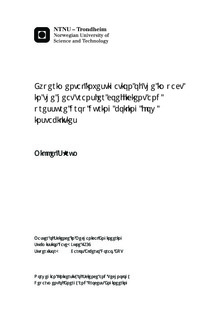Experimental investigation of the impact in the heat transfer coefficient and pressure drop during boiling flow instabilities
Master thesis
Permanent lenke
http://hdl.handle.net/11250/235740Utgivelsesdato
2014Metadata
Vis full innførselSamlinger
Sammendrag
High heat transfer rates at reasonably low temperature differences can be obtained by utilizing a boiling fluid. The use of boiling heat transfer is often limited by onset of a heat transfer crisis named the Critical Heat Flux (CHF). The CHF is accompanied by an inordinate increase in temperature with the most severe consequence being related to the physical burnout of the heated surface. Two-phase boiling flows in channels are sometimes prone to flow instabilities. Density Wave Oscillations (DWO) is the most common type of thermo-hydraulic instability. DWO are fluid waves of alternating higher and lower densities propagating across the system. It is characterized by large cyclic fluctuations in flow rate and pressure and has a period of about twice the heated channel transit time. The literature survey condenses previous results and identifies different approaches for obtaining them in experimental studies. The purpose of this study is to perform an experimental investigation on the effect of flow instabilities on the heat transfer coefficient and pressure drop characteristics of a 5 mm uniformly heated horizontal boiling in-tube system utilizing R134a as the working fluid. The experiments confirmed that the system stability is improved by opening the inlet restriction valve and omitting exit orifice. The influence of the pump system characteristics on DWO was also explored. Establishing an unconditional stable system configuration allowed for generation of reference data. DWO was found to occur when vapor quality becomes sufficiently high in a system operating with inlet and exit restrictions and some degree of inlet subcooling. Mimicking DWO by superimposing flow oscillations by cycling the pump drive was also a viable solution. It was found that the overall heat transfer decreased proportionally to the flow amplitude. Shifting the period of oscillation from its natural frequency to lower frequencies reduces the heat transfer. The saturated boiling heat transfer coefficient was highly dependent on heat flux, and almost independent of flow rate, indicating that nucleate boiling was the dominant heat transfer mechanism. Comparisons were made to saturated boiling correlations. Heat transfer scales generally well with pressure drop, except a sudden reduction when DWO commences. The local heat transfer coefficient in the test section outlet increased with heat flux until it suddenly dropped due to an abrupt increase in wall temperature, distinguished as the normal CHF. The onset of DWO was found to trigger premature CHF at heat fluxed of about 90% the normal CHF.
